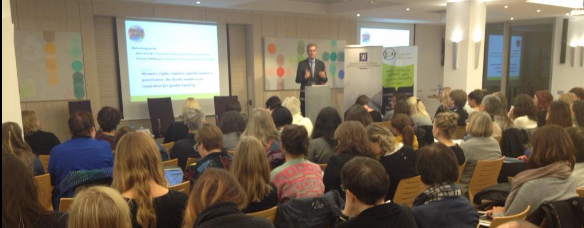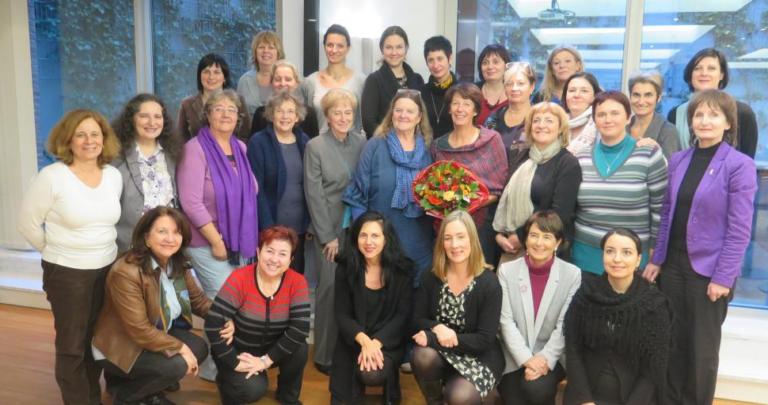[Brussels, 12 December 2013]The second meeting of the EU Civil Society Platform on Trafficking in Human beings took place on 9-10 December in Brussels, and gathered more than 100 NGOs from all over Europe. After a presentation of the Online Platform that will serve as a communication and networking tool, the participants were divided into three working groups, to discuss:
- The involvement of the civil society in the implementation of the Directive on trafficking in human beings
- The victim-centred approach: identification, assistance and protection, national referral mechanisms
- Demand reduction
EWL Policy Officer and Project Coordinator Pierrette Pape participated in the third workshop on Demand reduction, and was a rapporteur of the three-hour discussion amongst 40 participants. The EWL is pleased to see the issue of demand being addressed, as it has been years that we have been highlighting the links between the demand for prostitution and the phenomenon of trafficking in women and girls. If the EWL welcomes the inclusion, in the EU directive on trafficking, of an obligation for Member States to discourage and reduce the demand that fosters all forms of exploitation related to trafficking, we however regret the lack of political will to address the root causes of trafficking for sexual exploitation, which is prostitution.
As pointed out by a participant, trafficking is the only human rights violation driven by financial profit. Trafficking proliferates when profit is possible, and this money comes from the buyers: regarding trafficking for sexual exploitation, the buyers are the sex buyers of prostitution. Legal frameworks on the phenomenon of prostitution differ from one country to the other in the EU; in some countries, prostitution markets have been legalised, which makes it possible for NGOs to develop demand reduction strategies. A majority of participants of the workshop therefore called on the European Commission to challenge the national frameworks of the Member States in terms of demand reduction and of prostitution legislation. The EC should also investigate who has a direct financial interest in keeping trafficking (for example, the sex industry represents 5% of the GDP of the Netherlands). The EC should also propose a directive to criminalise the purchase of sex (based on article 83 of the Treaty, referring to sexual exploitation), therefore going beyond Article 18 of the EU directive on trafficking. To support this idea, they mentioned a recent Finnish governmental report, recommending extending the current Finnish legislation (which criminalises the purchase of sex from victims of trafficking, according to Article 18 of the EU directive) and criminalising all purchase of sex.
Moreover, as highlighted again by many participants, all forms of trafficking are gendered, and we urgently need to address gender inequality as a root cause for trafficking. When it comes to sexual exploitation and prostitution, the demand is clearly about men buying sex, and about a certain vision of masculinity. When it comes to domestic servitude, the demand reinforces stereotypes on women’s skills and roles. The European Commission should challenge this vision, based on its Strategy for Equality between women and men. Several participants therefore pointed out to the need of the EC Anti-Trafficking Unit to work with the EC Gender Equality Unit.
The EWL hopes that the outcomes of the workshop will be taken into account by the European Commission. Despite ten years of EU policy on trafficking, we see more victims identified and however less perpetrators convicted (according to Eurostat data). It is time to really address the root causes of all forms of trafficking, especially for sexual exploitation.



